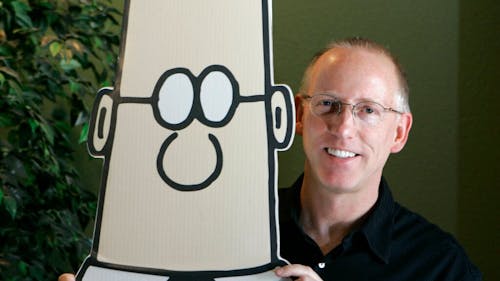Elon Musk shows support for 'Dilbert' creator, leaving us disappointed but not surprised

The last time we checked in with Elon Musk — somehow not even a month ago — we discussed some of his decisions as Twitter's new leader.
He was charging brand accounts $1,000 per month to retain their verified status, firing one of Twitter's two remaining principal engineers when they suggested his tweets were losing engagement out of a lack of public interest and demanding employees stop working from home, even as the company's San Francisco office was reportedly several months behind on rent.
All that being said, my question to you is: When was the last time "Dilbert" crossed your mind? If you're under the age of 30, it's not likely that you're aware of the comic strip satirizing the mundane nature of daily life and office work, outside of the property's merchandising popularity (especially desk calendars — "Dilbert" desk calendars were all the rage in the early- to mid-2000s).
Yet, somehow, the series found itself in the public discourse following a controversy surrounding Musk's endorsement of the comic's creator.
For some context, "Dilbert" was a comic strip first printed in April 1989 by American cartoonist Scott Adams about the absurdities of white-collar workplaces, modeled mostly after Adams' experience working at the telecom company "Pacific Bell."
The comic was a massive success and spun off into other mediums, such as a video game in 1997 and an animated TV series in 1999. The show received an Emmy the same year, while the original comic strip procured Adams a Reuben award from the National Cartoonists Society in 1998.
Adams has long been known as a controversial figure. In 2011, he made headlines comparing women's pay inequality to children demanding candy. And in 2015, he predicted former President Donald J. Trump's campaign victory, having written several blog posts explaining and admiring Trump's "persuasion" techniques.
Following the success of these posts, Adams created a daily web series on his YouTube channel called "Real Coffee With Scott Adams," where he discussed topics such as politics, success secrets and current events. His views began to gradually shift further right during this time, resulting in Adams appearing as a guest on several conservative outlets like "The Ben Shapiro Show."
Adams later voiced his outrage over the results of a Rasmussen poll that reported that 26 percent of Black Americans disagreed with the statement "It's okay to be white."
He then went on to label Black people as a "hate group," saying, "I don't want to have anything to do with 'em." This comment resulted in "Dilbert" getting dropped by its syndication company, Andrew McMeel Universal, days later.
In wake of the controversy, Musk voiced his support for Adams by simply tweeting, "The media is racist," in response to a pro-Adams tweet. He followed this tweet with another that claimed white and Asian people are subjected to racism as well.
That was, of course, not the only scandal with which Musk was involved around that time. As somebody minoring in gender and media studies, this next bit elevated this incident from just another "Elon Musk said something bigoted" story to "Well, now I have to talk about this" status.
Mere hours before his defense of Adams, Musk tweeted two memes. One involved a man trying to lure a mouse out of his wall by placing a sign with a clickbait article title near its hole, revealing itself to be a computer mouse.
The other was a four-panel comic that read "there are mouse traps…" next to a picture of an old-fashioned snapping mousetrap on the top half of the image. The bottom half of the image read "then, there are 'mouse traps'" next to a cropped image of an anthropomorphic mouse with a notably feminine appearance drawn by popular furry pornographic web artist "Zeiro."
The punchline of the first meme is fairly obvious, but those less aware of common internet or LGBTQ+ slang might be a bit confused regarding the second's meaning.
A "trap" is a pretty controversial term in the trans community. Although some may argue it's been reclaimed alongside words such as "queer," its original meaning came from its association with a classic internet meme of the "Star Wars" character "Admiral Ackbar."
The meme was often posted alongside an image of an attractive individual with an androgynous appearance, with the punchline being the insinuation that the person pictured was not cis-gendered.
Consequently, the term began being used as a slur to refer mostly to transgender women, but its usage has grown to include any individual assigned male at birth with an effeminate appearance.
Musk, of course, has never attempted to hide his transphobia and has instead championed his bigotry on several occasions, such as in a tweet from December 2022 that read: "My pronouns are Prosecute/Fauci."
It truly is embarrassing to see a famous and important CEO acting so immaturely on the internet. And it is beyond irresponsible, considering that bigotry on sites like Twitter is a real issue.
Especially when celebrities like J.K. Rowling make Twitter their own personal transphobic diary, one can only question how much Musk, someone who purports transphobia and racism himself, cares about issues like this happening on his site.
This kind of edge-lord-type bigotry is, of course, not new on the internet, but it is startling to see someone with so much power and influence participating. When you're someone like Musk, you have a massive and likely impressionable audience, considering so many young people admire him.
As such, you must know that others will note and repeat what you say and do. Using your platform to post support for racists and off-putting, transphobic memes only furthers the normalization of transphobia and racism. These actions are concerning in any scenario, but especially when it's done by Twitter's very own CEO.



